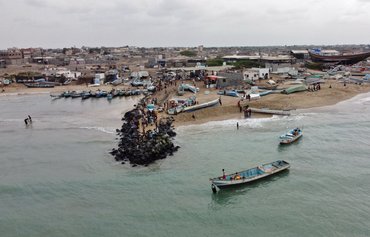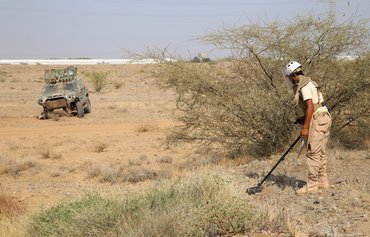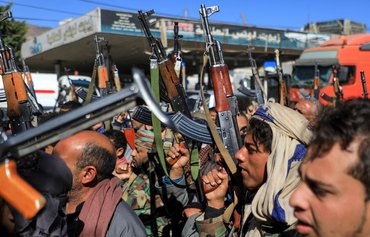ADEN -- Confessions of captured Houthi militia members have confirmed Iran's role in arming their group.
Yemeni National Resistance forces have arrested seven cells affiliated with the Houthi militia on the country's western coast, spokesperson Brig. Gen. Sadiq Duwaid announced on August 11.
The National Resistance, also known as the Joint Forces, is an elite group of up to 10,000 former members of the Yemeni Republican Guard and Central Security Organisation who fight the Houthi militia.
In a tweet, Duwaid said the cells comprised 35 members who had engaged in espionage, terrorist activities and smuggling of Iranian weapons into Yemen.
![The UK Royal Navy displays smuggled Iranian missiles the HMS Montrose seized in early 2022 in international waters south of Iran. [UK Ministry of Defence]](/cnmi_am/images/2022/08/23/36774-uk-arms-seizure-600_384.jpg)
The UK Royal Navy displays smuggled Iranian missiles the HMS Montrose seized in early 2022 in international waters south of Iran. [UK Ministry of Defence]
National Resistance media on August 13 broadcast the detained members' confessions, which shed light on the Houthis' recruitment methods as well as delivery points and other operational details.
Smuggling routes
The members of one of the cells, who were arrested in al-Khokha, were involved in weapons smuggling operations led by the Islamic Revolutionary Guard Corps (IRGC).
They confessed that they smuggled Iranian weapons from Bandar Abbas, Iran, to Houthi-controlled al-Hodeidah, Yemen.
Ali Halali, an al-Khokha native who was in charge of the cell and active in smuggling arms at al-Hodeidah port, confessed that he bribed his relatives who live in Yemen's liberated areas with large amounts of cash to facilitate the smuggling process.
The Houthi elements used visits to those relatives as an opportunity to hand them the bribes without arousing Yemeni security forces' suspicion, said Halali.
The confessions revealed that Houthi-affiliated elements were also present and active in the smuggling process in Bandar Abbas.
The cell members pointed to two main smuggling routes from Bandar Abbas to al-Hodeidah -- by sea and by land -- and indicated that traffickers unloaded shipments of weapons departing from Bandar Abbas onto small fishing boats in the Red Sea and the Arabian Sea several times.
In their confessions, the detained Houthi members said the cities of Bosaso and Berbera in Somalia are receipt and delivery hubs in the Iranian arms-smuggling network, and weapons are transferred to al-Hodeidah port from these cities.
They said smuggled shipments have included fertilisers containing ammonium nitrate, which is used in manufacturing explosives.
"The Houthi militia took advantage of the difficult economic conditions of the residents of al-Hodeidah, the poorest province in Yemen, to [pay] them for smuggling weapons," said economist Abdul Aziz Thabet.
Undermining regional security
The IRGC's involvement in smuggling arms from Iran to Yemen undermines the security and stability of Yemen and other countries in the region, said Yemeni Deputy Minister of Justice Faisal al-Majeedi.
The arms-smuggling operations are documented by the United Nations (UN) Security Council Panel of Experts on Yemen, he said.
US and UK naval fleets have seized Iranian weapon shipments en route to the Houthis, and the UN's Panel of Experts has reported that Iran was the source of these weapons after examining the debris of drones and missiles fired at targets in Saudi Arabia, al-Majeedi said.
The IRGC-led arms smuggling operations have intensified amid the extension of the UN-sponsored truce agreement in Yemen, said Yemeni Deputy Minister of Legal Affairs and Human Rights Nabil Abdul Hafeez.
The IRGC and the Houthis are taking advantage of the truce to prepare for further military action if the war is resumed, he said.
The well documented smuggling operations directed by the IRGC confirms "Iran's dangerous intention to step up arming of the Houthis and conduct military intelligence operations, which is why the international community must raise its level of vigilance", Abdul Hafeez said.

![Supporters of the Iran-backed Houthis brandish their weapons and raise portraits of their leader Abdul Malik Al-Houthi in a rally in Sanaa on June 3, a day after Yemen's warring parties agreed to renew a two-month truce. [Mohammed Huwais/AFP]](/cnmi_am/images/2022/08/23/36738-Yemen-Houthis-arms-600_384.jpg)






